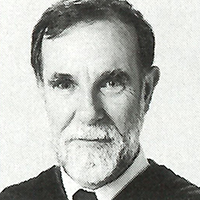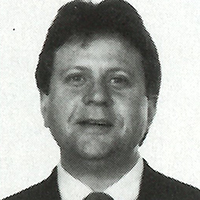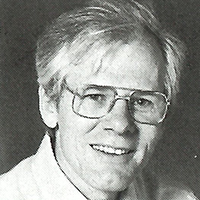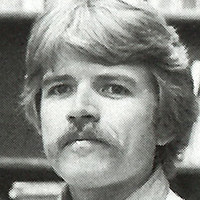How did Gulf War change America? 4 UW experts weigh in
War has always been a defining moment in American history. Our nation was born in the Revolutionary War and held together through the agony of the Civil War. At the end of World War II, the United States assumed a new role as a superpower.
Now the U.S. and its allies have triumphed in the Gulf War. While the oil fires still burn in Kuwait and the American troops make their way home, University of Washington historians and political scientists are beginning to reflect on how the war has changed the way Americans look at themselves—and the world around them.
In interviews conducted in March with four leading experts, a consensus comes through loud and clear. The victorious outcome of the war—and the few American casualties—have created a watershed in American public opinion.

Jon Bridgman
“My instinct says that it is a fundamental turning point,” says History Professor Jon Bridgman. “There is a massive change in attitude.” For 20 to 25 years, Americans tended to be dismissive of their own society. We were unable to do things the right way. Now that attitude seems to be wrong.”
“It is a watershed,” adds History Professor William Rorabaugh. “And it fits into an undefined event, the end of the Cold War. … It allows us to think about things in a different way.”
“I think it’s probably going to be a watershed,” replies Political Science Professor Lance Bennett. “If the Middle East stabilizes, it will be seen as a victory that meant something. If the Middle East falls apart, then people may ask what did this victory accomplish.”
“It is quite likely a turning point,” says fellow Political Science Professor Michael McCann. With more attention paid to foreign affairs and less to domestic problems, Americans may become “isolationists at home and interventionists in the world.”
While the professors agree that the war is a turning point, there is no consensus on which direction the nation is turning. Bridgman, famous for his lectures on 20th century American history, is upbeat. He sees a nation more confident at home and abroad.
One sign of change could be a wave of “buy American” sentiment. “If you have people buying more American cars and fewer Japanese cars, that really means there has been an effect,” Bridgman says.

Michael McCann
Political Science Professor McCann, who teaches a course in American political culture, is more pessimistic. He says the war is “emblematic” of the changes in American politics, where images have overtaken issues in the minds of voters. War is often a unifying experience for a nation.
McCann says in the Gulf War Americans found an “other” that united our heterogeneous population. “Saddam was a perfect candidate for an evil other,” he adds. “By confronting an other, we displace our own internal conflicts.”
Many of the images used to define Saddam Hussein and the Gulf War were borrowed from the Cold War, he maintains.
“The war was a video war and the images were totally controlled.” Perhaps the most important point of the war is that “politics has been redefined by high technology and video images into a consumer sport. It is distorted and artificial entertainment.”
What discourages McCann is that the average citizen is aware of the image manipulation. “Most people know that modern politics is smoke and mirrors, but it doesn’t bother them. They are willing to settle for that.”
The four concede that Americans are basking in the euphoria following the stunning victory. In March President Bush’s approval rating was at an all-time high and the military had become one of the most respected institutions in the nation. But these experts see problems ahead, whether or not the euphoria lasts, brought about by the change in popular sentiment.
Bridgman notes that during this century, the joy of victory has never lasted long. Opinion turned sharply after World War I, with a bitter, isolationist public by 1920.
After World War II, there was a brief period of “a feeling we could do anything,” says Bridgman. “The rest of the world made this mess, and we’ll clean it up,” was the popular mood. But within a year of V-J Day, there was an “awful feeling there might be a third world war,” he adds.
Yet after Operation Desert Storm, Bridgman adds, the euphoria may last “a lot longer.” Unlike other 20th century wars, dissent was tolerated during the Gulf conflict. Thus, he says, it is less likely to “bubble up” now that the war is over.
Casualties have been kept to a minimum and even civilian damage to Iraq has been “remarkably small.” Accounts of the horrors of war, so prevalent after both World War I and Vietnam, are less likely to sway the public mood.
Again, unlike Vietnam, military hyperbole has been kept to a minimum, Bridgman maintains. There were no “light at the end of the tunnel” statements, and the commanders “underplayed the dominance they had,” he explains. Despite media complaints of censorship, Bridgman feels “there has never been a country that told more truth than in this war. The things we left out were reasonably left out for military purposes.” For all these reasons, he says the euphoria is likely to last.
American History Professor Rorabaugh disagrees. “The history of euphoria is that it never lasts,” he comments. “As complications unfold over the next six months to a year, and because we are involved in a major way now, there are going to be questions about our involvement. What that will do is kill the euphoria. Questions always kill the euphoria.”
Both political scientists also feel the euphoria is short term. McCann likens it to “a Chinese dinner,” and Bennett says, “I have trouble reading the level of euphoria.” A specialist in public opinion and author of Public Opinion in American Politics, Bennett says, “This was not a world war. It was over so quickly. I suspect that the euphoria will subside quickly.”
He also feels that there are dangers in this era of good feelings. “It’s not good for a nation to be swept away on an unending emotional tide. There needs to be some balance and attention to world and domestic problems. It requires more sober and careful thought.”

William Rorabaugh
Rorabaugh, an expert on protest in the 1960s and author of Berkeley at War, also sees some negative effects. With the military in ascendancy, he worries that there could be a rise of militarism. “The one virtue of the Vietnam syndrome was that it prevented that. No one was going to suggest interfering in a Third World conflict.” Now America might fall into becoming “arms provider and policeman to the world,” he warns.
The history professor notes that President Bush “is more willing to use American military forces than any other American president.” Counting the invasion of Panama, there have been two wars in the first two years of Bush’s presidency, he adds, and “that’s a record.”
But Bridgman sees great benefit in the successful use of military power. “The confidence in the use of power should have a salutary effect on a lot of people, including the Russians.”
While McCann discounts a rise in militarism, he does feel the “peace dividend” will be diverted back into future Pentagon budgets. One message of the war, he feels, is that “we can’t win the battle against social problems like we can win battles against Third World countries.”
Bennett agrees that for those who came of age in the 1980s, war has become a more acceptable solution to international conflicts. “The Reagan generation is likely to regard war as a less serious problem, especially as it is applied against small, Third World nations,” he says.
But that feeling will only last “until another war comes along,” he warns. And he doesn’t agree that the public’s attention will be diverted away from domestic issues. “If the politicians point to this as a substitute for a domestic political program, it won’t wash. People will eventually wake up.”

Lance Bennett
But Bennett expects the Republicans and President Bush to do just that. “Look for campaigns wrapped around it,” he says. “The administration is going to get as much mileage as it can, and that’s what politicians do for a living. Everyone jumps on the bandwagon when it is moving in their direction.”
But there are some who will want to pull the bandwagon in their own direction. “People at the bottom are not diverted by this. It won’t change the African American agenda,” says McCann. Citing the high percentage of minority troops and the leadership of Gen. Colin Powell, the political scientist says the war will “increase their sense of entitlement.”
Both Bennett and Rorabaugh predict a drop in the president’s popularity rating. “Bush has nowhere to go but down now,” Rorabaugh notes, “though he might coast pretty high for a while.” The American economy will pull down Bush’s rating, he adds. Citing the budget deficit and a shaky financial system, Rorabaugh says, “It just doesn’t look like the ’90s are going to be an economically viable decade.”
Public opinion expert Bennett agrees that the economy is a dark cloud on the horizon, as is the situation in the Middle East. Citing the ecological havoc of oil spills and oil well fires, the struggle of Saddam Hussein to stay in power, and the Palestinian-Israeli conflict, he says, “The region will quickly sober people to the reality that war is not going to solve everything.”